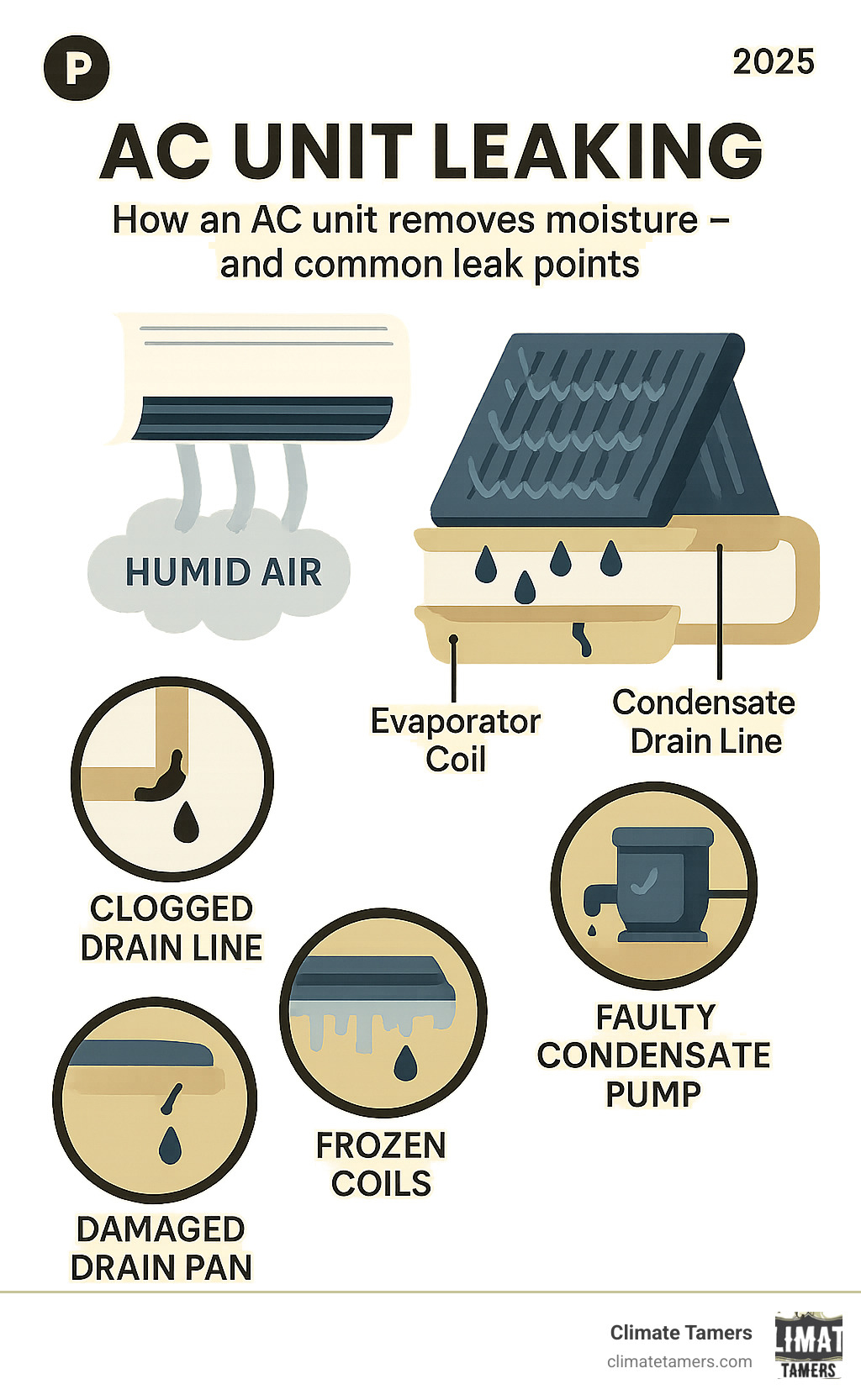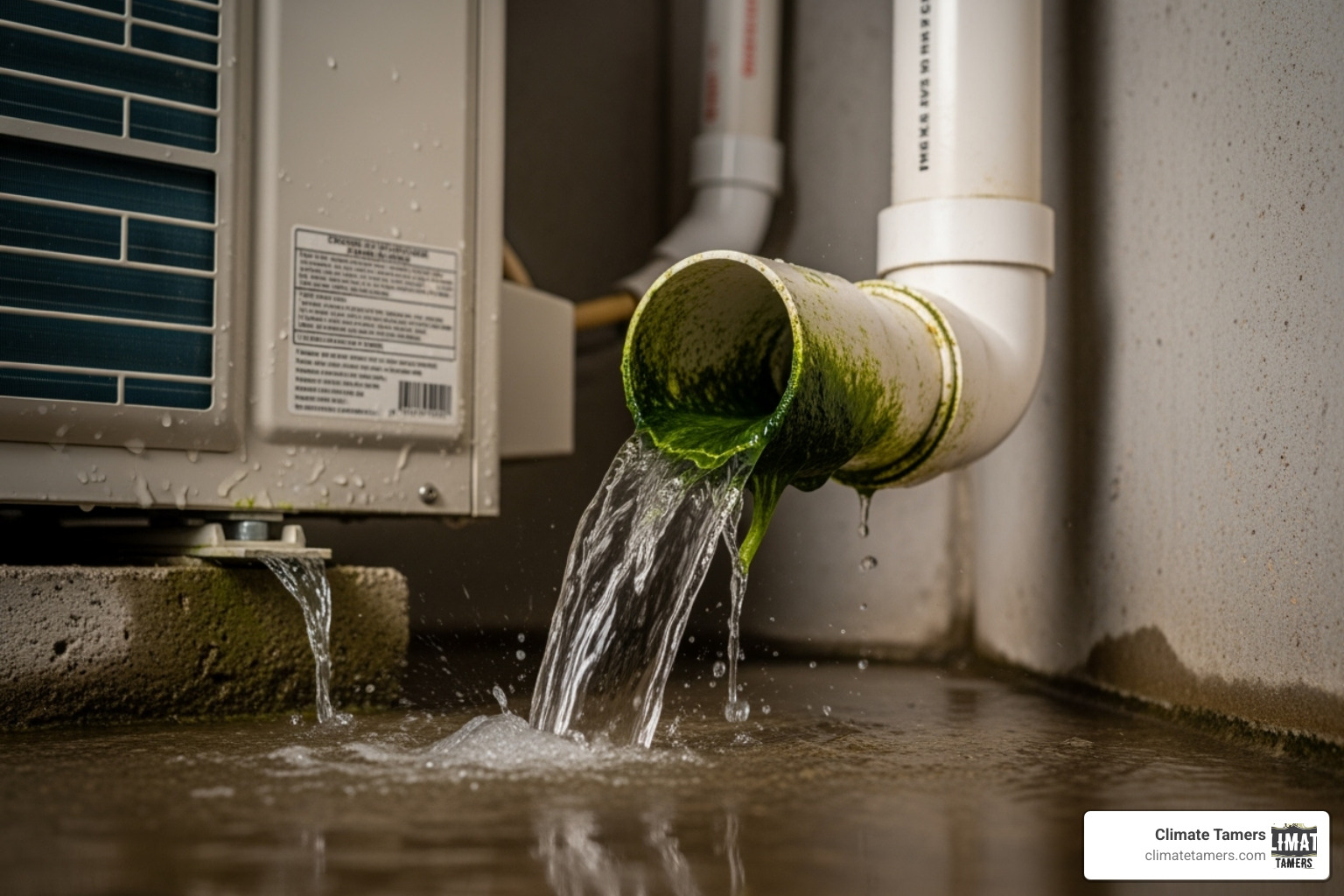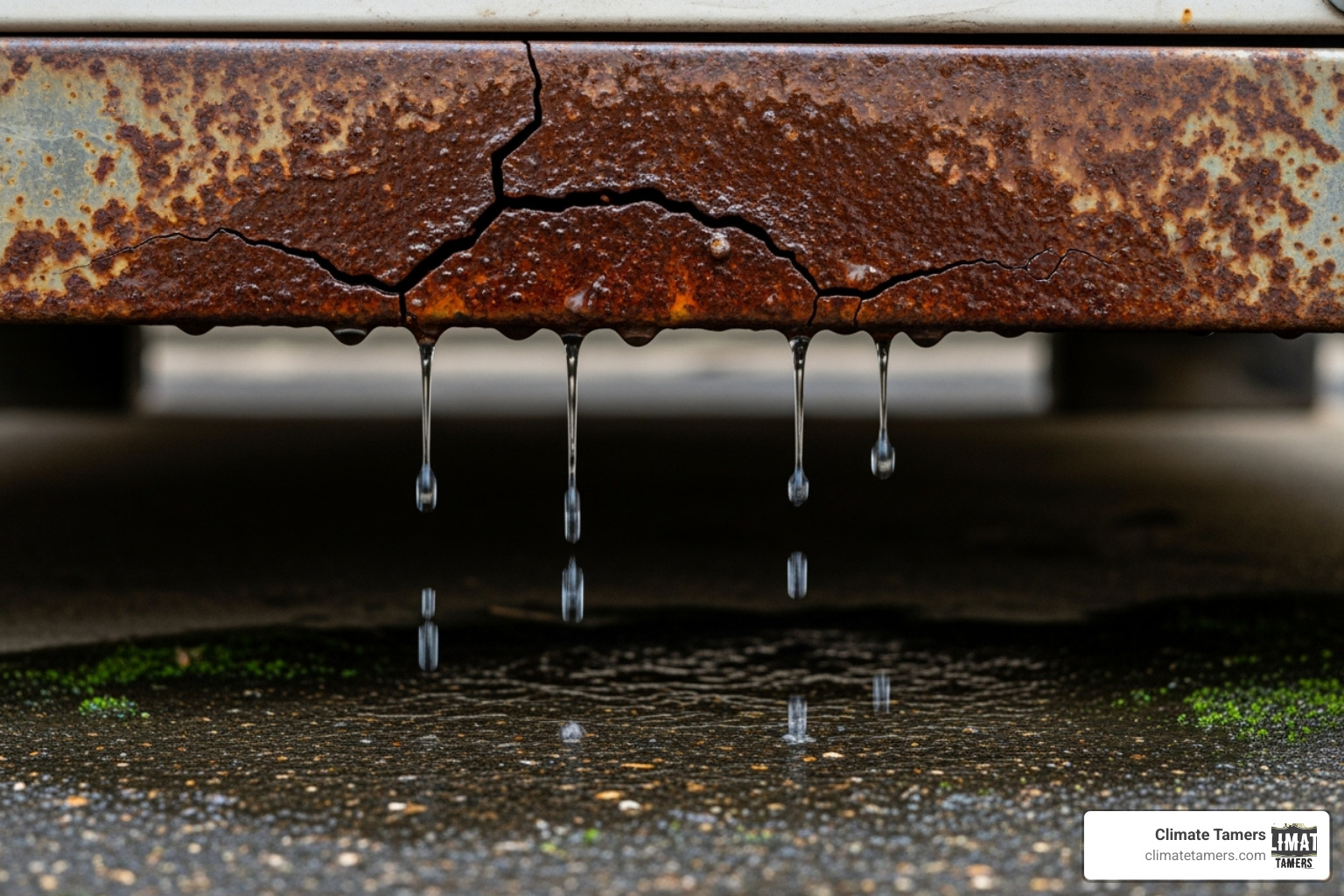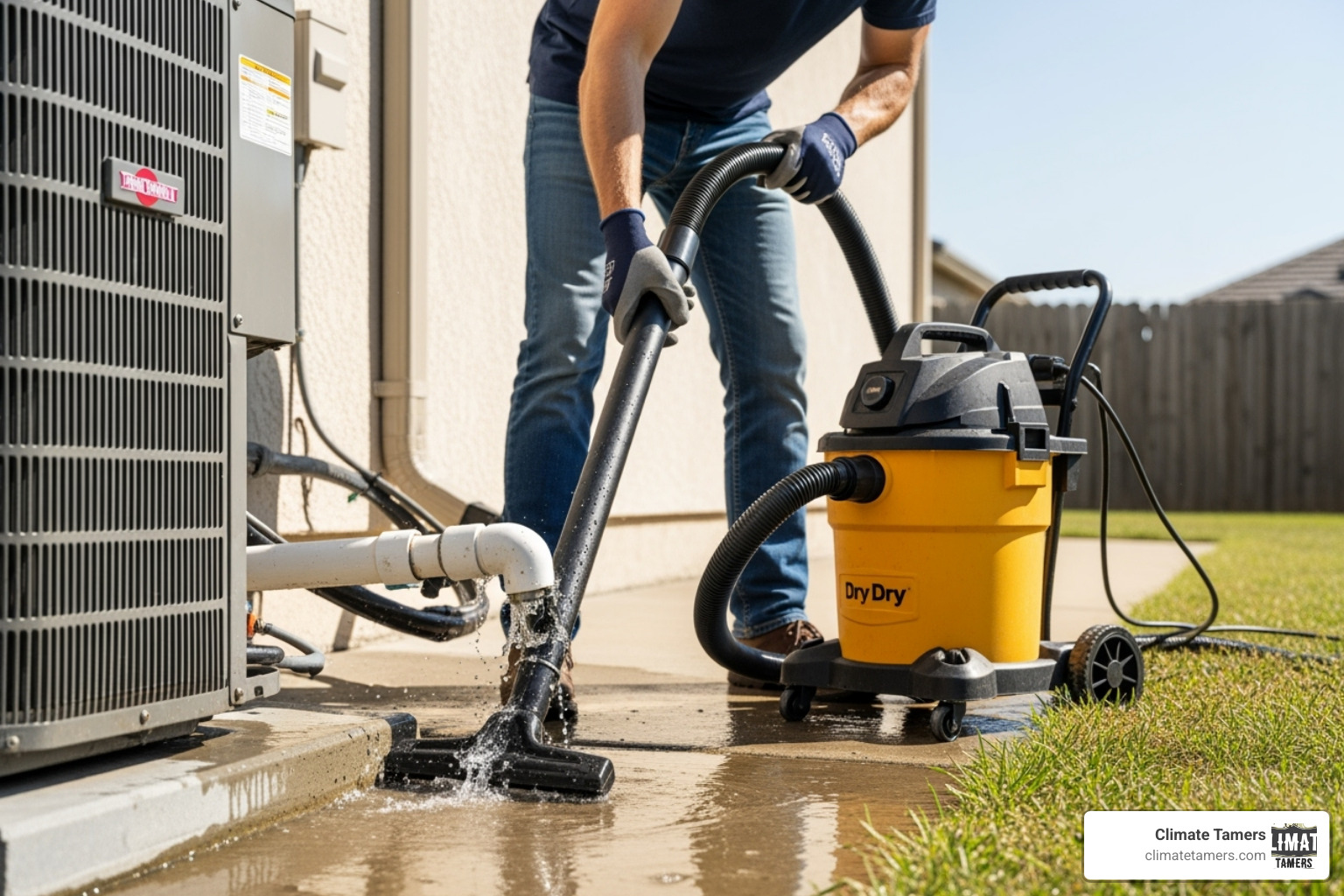Why Is My AC Unit Leaking Water?
When you find your ac unit leaking water, it’s usually a sign that something in your cooling system needs attention. The good news? Most AC water leaks are fixable problems that don’t require replacing your entire system.
Quick Answer: Common causes of AC water leaks include:
- Clogged condensate drain line (most common)
- Dirty air filter causing frozen coils
- Damaged or rusted drain pan
- Broken condensate pump
- Improper installation or unlevel unit
Your air conditioner naturally creates water as part of its cooling process. When warm, humid air (especially common here in New Orleans) passes over the cold evaporator coil, moisture condenses into water droplets. This water should collect in a drain pan and flow outside through a drain line.
But when this normal drainage process gets interrupted, you’ll see water where it shouldn’t be – pooling around your indoor unit, dripping from vents, or causing water stains on walls and ceilings.
The stakes are higher than just inconvenience. Ignoring an AC water leak can lead to mold growth, structural damage, and even complete system failure. In our humid climate, these problems develop faster than in drier regions.
The key is knowing whether you’re dealing with normal condensation, a simple maintenance issue, or something that needs professional attention right away.
Top 5 Reasons Your AC Unit is Leaking Water
Finding a puddle of water around your AC unit is alarming, but don’t panic. An ac unit leaking water is often a sign of a fixable problem. In our humid New Orleans climate, your air conditioner works overtime removing moisture from the air. When that water ends up in the wrong place, it’s usually for one of these five common reasons.
Clogged Condensate Drain Line
This is the most common cause of an ac unit leaking. Your AC acts as a dehumidifier, pulling moisture from the New Orleans air. This water, or condensate, collects in a drain pan and flows outside through a PVC pipe.
The problem begins when that drain line gets clogged with algae, dirt, and debris. Our humid climate creates ideal conditions for algae to grow in the dark, damp pipe.
When the line is blocked, water backs up and overflows the drain pan, causing a leak. Fortunately, this is often a straightforward fix. You can learn How to clean a clogged AC drain line or check out our guide on how to Resolve HVAC Condensate Drain Line Clog.
Dirty Air Filter & Frozen Evaporator Coils
Surprisingly, a dirty air filter can cause your AC to leak. When the filter is clogged, it restricts airflow. Your AC can’t pull enough warm air over the evaporator coil, causing the coil to get too cold and freeze.
Ice builds up on the coil, and when the system cycles off, this ice melts all at once, overwhelming the drain pan. The result is an ac unit leaking water. If you see ice, turn off your AC to let it thaw (setting the thermostat to “fan only” can help).
This is why regular filter changes are crucial. Need help with filter maintenance? Check out this guide on How to clean an AC filter. For more details about frozen coils, read our article Why is Your Air Conditioner Freezing Up?
Damaged or Rusted Drain Pan
The drain pan sits under your evaporator coil to catch condensate. Over time, it can fail. Older metal pans can rust through, while newer polymer pans can crack.
If your AC is over 12-15 years old, the drain pan may be at the end of its life. A leak from a damaged pan can cause significant water damage, especially for units in an attic. Some systems have a primary and a Secondary drain pan for extra protection.
You can find more information about Galvanized steel drain pans if you’re curious. While a temporary patch might seem appealing, a damaged drain pan typically requires professional replacement for a permanent solution.
Broken Condensate Pump
If your indoor unit is in a basement or location where gravity can’t drain the water, it uses a condensate pump. This small pump pushes water outside. When this electrical pump fails, water backs up and overflows its reservoir, causing an ac unit leaking water.
Signs of failure include strange noises or the pump not running at all. Many have a safety switch that shuts off the AC to prevent flooding. A broken pump usually needs to be replaced by a professional due to the electrical work involved.
Improper AC Installation
Sometimes, the leak is due to improper installation. The most common issue is an unlevel indoor unit. The air handler must be perfectly level or slightly tilted toward the drain line to ensure proper drainage. If it’s off-kilter, water will pool and overflow the pan.
You can check this with a level tool or a Bubble Level app. Other installation flaws include kinked drain lines or poor connections. If your AC has leaked since it was new, improper installation could be the culprit. A professional can assess and correct these issues, ensuring your system is reliable.
Is It Water or Refrigerant? Spotting a Serious Leak
When you find your ac unit leaking, you must first identify the fluid. A water leak is an inconvenience that needs fixing, but a refrigerant leak is a serious problem that requires immediate professional attention due to health risks and potential system damage.
Telltale Signs of a Water Leak
Water leaks are caused by condensation issues and are usually easy to spot. Look for:
- Pooling water around the indoor unit.
- Water stains on ceilings or walls near vents.
- A musty smell, indicating mold or mildew from the excess moisture.
- High indoor humidity, as the system isn’t removing moisture effectively.
Warning Signs of a Refrigerant (Freon) Leak
Refrigerant (often called Freon) is the chemical that cools your home. A leak is a serious issue. Unlike water, it’s a gas, making it harder to detect. Here’s how to tell the difference:
| Feature | Water Leak Signs | Refrigerant Leak Signs |
|---|---|---|
| Visual | Puddles, drips, water stains, visible mold | No visible liquid (unless it’s an oily residue near the leak point) |
| Sound | Dripping, gurgling (from clogged drain) | Hissing or bubbling sounds (from escaping gas) |
| Smell | Musty, moldy | Faint, sweetish, or chemical/chloroform-like smell |
| Cooling | AC may still cool, but inefficiently | Decreased cooling efficiency, warm air from vents |
| Energy Bill | May increase due to system overwork | Often skyrockets as AC runs constantly to compensate |
| Coil Appearance | May have ice buildup due to restricted airflow | Often has ice buildup due to low pressure/temperature |
| Health Risks | Mold exposure, respiratory issues | Nausea, headaches, dizziness, refrigerant poisoning |
Key warning signs of a refrigerant leak include:
- Hissing or bubbling sounds from escaping gas.
- An oily residue on refrigerant lines.
- A faint, sweet, or chemical smell.
- Reduced cooling or warm air from vents.
- Skyrocketing energy bills as the system runs constantly.
- Ice on the coils due to low pressure.
Refrigerant is toxic, and exposure can cause headaches, dizziness, and nausea. A leak will also strain and eventually destroy your AC’s compressor, leading to a very expensive failure. Early detection is critical, so be aware of AC Issues That Need Professional Repair.
When to Turn Off Your AC Immediately
Some leaks require you to shut down your system immediately at both the thermostat and the circuit breaker. Turn it off if you see:
- Significant, rapid water pooling causing immediate property damage.
- Any sign of a refrigerant leak (hissing, chemical smell, warm air from vents).
- Electrical hazards, such as water dripping on electrical parts or sparks.
- The unit suddenly stops working, which could be a safety switch activating to prevent a flood.
When in doubt, turn off the power and call a professional.
Your DIY Troubleshooting Checklist for an AC Unit Leaking
Before calling a professional for an ac unit leaking water, you can perform a few simple diagnostic steps. Many leaks are caused by basic maintenance issues you can fix yourself with a little know-how.
Step 1: Turn Off the Power for Safety
Safety is the top priority. Water and electricity are a dangerous mix.
- Set your thermostat to the “Off” position. This stops the cooling cycle and allows any ice to thaw.
- Go to your circuit breaker panel and switch off the breaker for your AC system. There may be separate breakers for the indoor and outdoor units; turn off both. This is a critical step to prevent electrical shock.
Step 2: Inspect and Clean the Air Filter
A dirty air filter is a common cause of an ac unit leaking.
- Locate the filter: It’s usually in the return air duct near the indoor unit or in a wall/ceiling vent.
- Inspect it: Pull the filter out. If it’s clogged with dust and you can’t see light through it, it needs to be cleaned or replaced. A clogged filter restricts airflow, causing the evaporator coils to freeze. When the ice melts, it overflows the drain pan.
- Clean or replace: Check if your filter is disposable or washable. Replace disposable filters every 1-3 months. Wash reusable filters with cool water and let them dry completely before reinstalling.
- Thaw frozen coils: If you found ice, allow the coils to thaw completely (which can take several hours) before turning the AC back on. For more tips, see our guide on Common Air Conditioner Problems and How to Fix Them.
Step 3: Check and Clear the Condensate Drain Line
If the filter is clean, check the condensate drain line, the PVC pipe that carries moisture outside.
- Use a wet/dry vacuum: Find the end of the drain line outside your home. Secure the vacuum hose over the pipe’s opening and run the vacuum for a few minutes to suck out any clogs of algae and debris.
- Try a vinegar flush: If you can’t use a vacuum, find the T-shaped access port on the drain line near your indoor unit. Remove the cap and slowly pour in one cup of distilled white vinegar to kill algae and break down sludge. Let it sit for 30-60 minutes, then flush with water. Important: Never mix vinegar and bleach, as this creates toxic gas.
Step 4: Inspect the Drain Pan
Finally, inspect the drain pan located under the evaporator coil. Use a flashlight to look for:
- Cracks or holes: Even small ones can cause leaks.
- Rust: On older metal pans, rust can eat through the material.
- Standing water: If water remains after clearing the drain line, the pan may be damaged or improperly sloped.
While a temporary patch is possible for small cracks, a pan with significant damage needs professional replacement. If you’ve completed these steps and the ac unit leaking problem continues, it’s time to call for professional help.
Prevention and When to Call a Professional
Preventing an ac unit leaking water is far better than fixing one. Proactive care and knowing when to call an expert can save you time, money, and frustration, especially during a New Orleans summer.
The Best Offense: Preventative AC Maintenance
Regular maintenance is the best way to prevent leaks.
- Schedule Annual Tune-Ups: A professional inspection each spring is your best defense. A technician will check all leak-prone components, flush the drain line to prevent clogs, and clean the coils.
- Keep Coils Clean: Clean evaporator and condenser coils ensure efficient operation and prevent ice buildup that leads to leaks.
- Replace Filters Regularly: Changing your air filter every 1-3 months is the easiest and most cost-effective way to prevent frozen coils and subsequent water damage.
Our AC Repair Maintenance Essential Tips can help you stay on top of your maintenance game.
Knowing When to Call a Professional for an ac unit leaking
While DIY troubleshooting is great, some problems require a professional. Call an expert for:
- Refrigerant Issues: Leaking refrigerant is hazardous and requires certified technicians to handle. If you suspect a refrigerant leak, call for help immediately.
- Persistent Frozen Coils: If coils keep freezing after you’ve changed the filter, it indicates a deeper problem like low refrigerant or a failing motor.
- Electrical Problems: If you see sparks, smell burning, or notice water near wiring, turn off the power and call a professional.
- Major Part Replacement: Replacing a condensate pump or drain pan requires technical expertise to ensure it’s done correctly and safely.
- Installation Issues: If you suspect the original installation was faulty, a professional can diagnose and correct it permanently.
There are many 5 Benefits of Repairing Your Air Conditioner professionally, including ensuring the job is done safely and correctly the first time.
The Consequences of Ignoring an ac unit leaking
Ignoring an ac unit leaking can lead to severe consequences, especially in our humid climate:
- Mold Growth: Excess moisture is a breeding ground for mold, which can cause health issues and require costly remediation.
- Structural Damage: Water can warp floors, ruin drywall, and damage your home’s structural integrity.
- Electrical Hazards: Water dripping on electrical parts can cause short circuits or even fires.
- Complete System Failure: The strain from a persistent leak can wear out major components like the compressor, leading to a full system replacement.
- Higher Energy Bills: A leaking, inefficient system works harder, driving up your electricity costs.
The bottom line? A small leak today can become a big problem tomorrow. But with the right care and timely professional attention, your AC can keep you cool and comfortable for years to come.
Don’t Let a Leak Dampen Your Day
Finding an ac unit leaking water is frustrating, but most leaks are fixable without needing to replace your entire system. As we’ve covered, the cause is often a clogged drain line, a dirty filter, a damaged pan, a broken pump, or improper installation.
The key is to act quickly. A small leak can lead to major issues like mold and structural damage, especially in our humid climate. Addressing problems early saves you from more expensive repairs later. Regular maintenance, including annual tune-ups and frequent filter changes, is the best way to prevent leaks before they start.
While some issues can be fixed with DIY troubleshooting, problems involving refrigerant, electrical components, or persistent leaks require professional expertise. That’s where we come in.
Here at Climate Tamers, we provide prompt, reliable solutions for homeowners throughout the Greater New Orleans Area, including Metairie and Kenner. We’ve built our reputation on exceptional customer service and are committed to earning your trust.
Don’t let a leak compromise your home’s comfort and safety. Whether you need emergency repairs or routine maintenance, we’re here to help you stay cool.
For expert help with your AC, explore our New Orleans air conditioning services and let us become your trusted HVAC partner for life.







